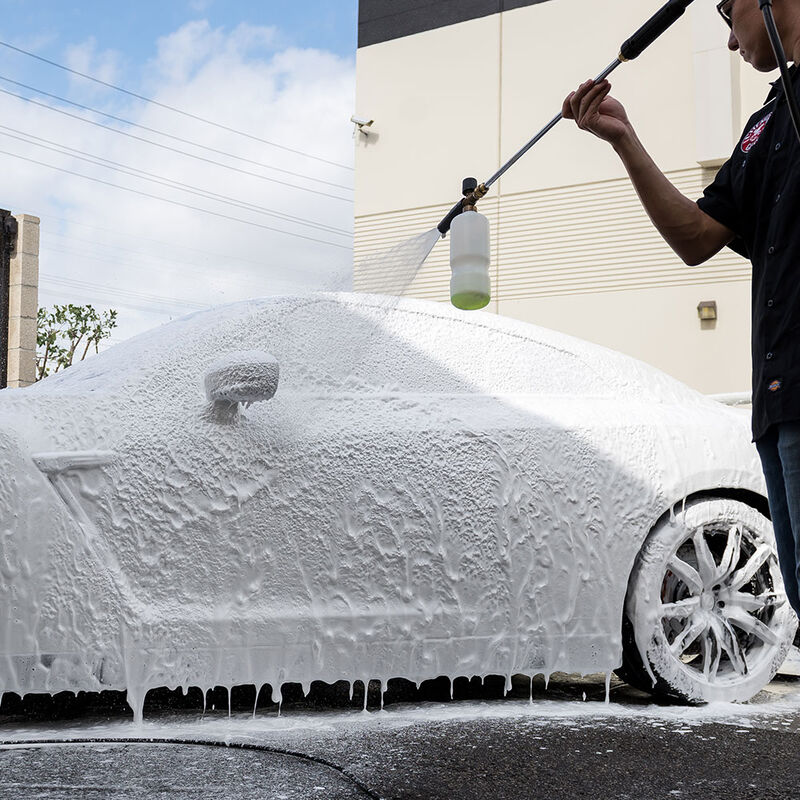Introduction
Your car’s paint isn’t just for show—it’s the first layer of protection against environmental elements. But did you know something as simple as water can harm it? Hard water, in particular, is a silent culprit that can damage your car’s glossy finish. Let’s dive into what hard water is, how it impacts your car and what you can do to prevent it.
What is Hard Water and Its Composition?
Hard water contains high levels of minerals like calcium and magnesium. These minerals, while harmless to humans, can wreak havoc on your car’s paint. Unlike soft water, hard water leaves visible spots and mineral deposits when it evaporates.
How Hard Water Impacts Your Car’s Paint
When hard water dries on your car, the minerals don’t evaporate. Instead, they settle as stubborn white spots. Over time, these deposits build up, creating a rough texture and dulling the paint. If left untreated, they can even etch into the clear coat, leading to permanent damage.
Signs of Hard Water Damage on Car Paint
Noticing dull spots or streaks after a wash? That’s a clear sign of hard water damage. Other indicators include:
- Persistent water spots even after drying.
- Fading paint that lacks shine.
- Difficulty removing stains with regular washing.
Scientific Explanation of Hard Water Damage
When hard water dries, the minerals crystallize on the paint’s surface. Under sunlight, these minerals heat up, causing chemical reactions that degrade the paint’s clear coat. UV rays further exacerbate this damage, making your car look older than it is.
Common Mistakes While Cleaning Cars with Hard Water
Many car owners unknowingly contribute to hard water damage. Some common mistakes include:
- Letting the car air-dry after washing which allows mineral deposits to form.
- Using untreated tap water for rinsing.
- Neglecting to use microfiber cloths or drying towels.
Preventive Measures Against Hard Water Damage
Prevention is better than cure. To protect your car from hard water damage:
- Wash your car with softened or filtered water.
- Always dry your car with a microfiber cloth or blower.
- Apply protective coatings like wax or ceramic coating.
Importance of Protective Coatings
Protective coatings act as a shield against hard water. Ceramic coatings, for instance, create a hydrophobic layer, preventing water from sticking. Waxing also offers a temporary barrier reducing the impact of mineral deposits.
DIY Solutions to Minimize Hard Water Damage
If your car already shows signs of hard water damage, try these DIY remedies:
- Vinegar Solution: Mix equal parts of vinegar and water. Spray on the affected area and wipe gently.
- Baking Soda Paste: For tougher stains, apply a baking soda paste, let it sit and scrub lightly.
- Water Softener: Use a household water softener to reduce mineral content.
Professional Solutions for Hard Water Damage
Sometimes, DIY fixes aren’t enough. Professional detailing at GlossZilla Car Detailing Studio can restore your car’s original shine. Services like paint correction and steam cleaning effectively remove hard water spots and protect the paint.
Best Practices for Washing Your Car
To avoid hard water damage, follow these best practices:
- Use a foam cannon or high-quality car shampoo.
- Rinse thoroughly with softened water.
- Dry immediately with a microfiber towel or blower.
How to Identify Hard Water in Your Area
Not sure if you have hard water? Test your tap water using a water hardness kit. Alternatively, check local water quality reports or look for signs like soap scum in your sinks and showers.
Cost-Effective Solutions for Hard Water Issues
Dealing with hard water doesn’t have to break the bank. Affordable water softeners and detailing kits can go a long way in protecting your car. Professional services may cost more upfront but save you from expensive repairs later.
Conclusion
Hard water is a common but preventable threat to your car’s paint. By understanding its impact and taking proactive steps, you can keep your car looking new and shiny for years. Don’t wait—act today to protect your investment!
FAQs
1. Can hard water permanently damage car paint?
Yes, prolonged exposure can etch into the clear coat causing permanent damage.
2. What’s the best way to remove water spots?
A vinegar-water solution is effective for light spots. For tougher stains, professional detailing is recommended.
3. Is ceramic coating worth it?
Absolutely! Ceramic coating provides long-lasting protection against hard water and other environmental elements.
4. Can I wash my car with tap water?
It’s better to use softened or filtered water to avoid mineral deposits.
5. How often should I wax my car?
Waxing every 3-4 months offers optimal protection against hard water and UV rays.


